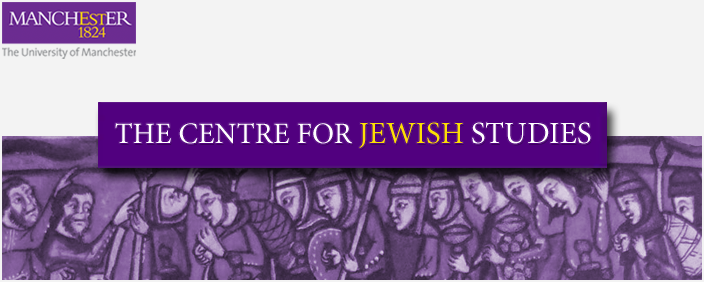Research Seminar Programme 2014-15
As was the case in 2012 and 2013, this year's seminars tend to have an Israel Studies theme. Please note that most of the Israel Studies seminar programme will take place on Thursdays at 4pm in room A113 in Samuel Alexander Building (Building 67 on the Campus Map, see directions). Our seminar programme is open to all (for free) and there is no need to book, but please see the statement below on University events open to the public.
SEMESTER ONE
Thu 6 November: David Hirsh (Goldsmiths, University of London), Contemporary struggles over defining antisemitism and how it is related to criticism of Israel. 4pm in A113, Samuel Alexander Building. Abstract.
SEMESTER TWO
Wed 11 February: David Newman (Ben Gurion University) Rethinking Borders: Deterritorializing the Two State Solution. Note: 4pm in A7, Samuel Alexander Building. Abstract.
Thu 19 February: Sarah Hirschhorn (Oxford Centre for Hebrew and Jewish Studies, Oxford), The Origins of the Redemption in Occupied Suburbia? Rabbi Shlomo Riskin and the Jewish-American Makings of the West Bank Settlement of Efrat, 1973-2014. 4pm in A113, Samuel Alexander Building. Abstract.
Thu 5 March: Michael Hilton (Leo Baeck College), The Zigzag Kid: Patterns of Bar and Bat Mitzvah in Israel. 4pm in A113, Samuel Alexander Building. Abstract.
Wed 11 March: Jan Lorenz (Manchester University): Pathways to Jewishness: Jewish proselytes and conversion programmes in contemporary Poland. Note: 3pm in A112, Samuel Alexander Building.
Thu 19 March: Rebecca Steinfeld (Stanford University), War of the Wombs: Struggles over Abortion Policies in Israel. 4pm in A113, Samuel Alexander Building. Abstract.
Tue 28 April: Shimon Redlich (Emeritus, Ben Gurion University), A New Life in Israel: Kibbutz Merhavia. Note: 3pm in B2.4 Ellen Wilkinson Building. Abstract.
Thu 7 May: Joachim Schlör (University of Southampton), The Sea Voyage as a transitory experience in German-Jewish emigration after 1933. 4pm in A113, Samuel Alexander Building. Abstract.
Thu 14 May: Yuval Sinai (Yale Law School), Jewish Law in Israel: Law, Religion and State. 4pm in A113, Samuel Alexander Building. Abstract.
OTHER JEWISH STUDIES RELATED EVENTS
Tue 11 Dec: Anastasia Valassopoulos (University of Manchester), Constructing the Refugee: 'Biblical Time' and 'Scriptural Geography' at work in the Visual Culture of the Holy Land (1946- 1949). 4pm in A113, Samuel Alexander Building. (Religions & Theology research seminar)
27-29 Jan: The Bogdanow Lectures 2015: Christopher Browning.
Mon 16 Feb: Elian Weizman (SOAS), Resistance to Zionism as an Educative Practice. 5pm in University Place Room 2.217. (Middle Eastern Studies research seminar)
Thu 26 Feb: Dan Garner, Assessing Post-Holocaust Theologies of Image: Melissa Raphael's Fraught Theology of Divine Powerlessness. 4pm in A113, Samuel Alexander Building. (Religions & Theology research seminar)
Thu 16 April: Yvonne Sherwood (University of Kent), 'The "Hagaramic" as a provocation for European Provincialism: Surrogate, Rogue, Resident Alien, Foreign Body'. 2pm in A113, Samuel Alexander Building. (Ehrhardt Seminar, Centre for Biblical Studies)
27-30 April: The Sherman Lectures 2015: Amy-Jill Levine.
30 April: Prof. Dr. Emile G. L. Schrijver (University of Amsterdam): 'The John Rylands Library as a Primary Source for the Study of Hebrew Books since the Invention of Printing'. (The 2015 John Rylands Research Institute Annual Lecture). 6pm The Historic Reading Room, The John Rylands Library.
7 May: Anita Lasker-Wallfisch 'Music and Auschwitz'. 4:15pm, Cosmo Rodewald Concert Hall, Martin Harris Centre for Music and Drama. (Music Research Forum)
UNIVERSITY EVENTS OPEN TO THE PUBLIC: A NOTE ON CONTROVERSIAL VIEWS AND THE ACADEMY
The critical exchange of academic ideas, interpretations, and arguments must flow freely on any topic. University seminar papers are one of several proper settings for the critical scrutiny of all academic arguments. To provide the setting for such academic exchange is one of the core duties of Universities. Speakers are invited because their work has demonstrated significant research quality or achieved research impact, and the scrutiny does not proceed by pre-judging/judging the personal motivations of speakers. It proceeds by exposing the claims of seminar speakers to critical and evidence-based responses, both in the longer term and on the day. The speakers’ positions as well as the scrutiny and responses they receive from others in the field become part of the ongoing review of new claims that characterises all University subjects. This always takes time, but it is the ultimate source of all informed discussion which takes place outside the University as well. Thus a seminar series fulfils a vital function in the exchange and critical scrutiny of ideas, data, interpretations and evidence. Please see the University's Statement on Academic Freedom.
Archive: Previous CJS Research Seminars



